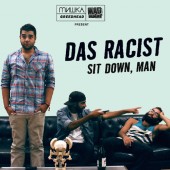
Das Racist
Sit Down, Man Mixtape
(Mad Decent/Mishka/Greedhead; 2010)
By Chris Molnar | 4 October 2010
A popular topic of conversation amongst my friends and me is how exactly Das Racist make money. That they rap for love of the game, and apparently for none of its trappings, is one of their chief pleasures—and maybe why they tap into the zeitgeist so well. Unlike their pals and ideological kin, MGMT, there’s no major label money making their don’t-give-a-shit attitude sound like rock star whining. Rather, the don’t-give-a-shit attitude ends up boosting the plugged-in talent that makes Das Racist’s two recently unleashed mixtapes the biggest discoveries of the year.
It’s not just a lack of cognitive dissonance; there’s no confusion at all here. Himanshu Suri, Victor Vazquez, and “hypeman” Ashok Kondabolu mean precisely what they say, their swagger doubled by how world-weary they can come off. But unlike De La Soul is Dead (1991), another genial, unassumingly clever rap album with eclectic beats, Sit Down, Man, like Shut Up, Dude before it, is quick enough to never slip into a preexisting mode. Yes, it happily picks up the mantle of the silly, “conscious” rhymes of the golden age Native Tongues groups with which Das Racist seem increasingly worthy of being named, in a way that makes one forget the gangsta/Roots-ian self-seriousness that also birthed Yeezy, Weezy, and Jeezy as necessary foils. But those rappers don’t “celebrate the fact I’ve moved into my mother’s basement,” succeeding rather as a rearticulation of the zany and inspirational qualities of classic rap, of the belief that hip-hop can be a limitless forum for self-improvement. Das Racist bleed absurdism and battle-rap bravado of neediness—to be taken seriously, to be part of a preexisting scene (other than “rap” in the most vague sense), or to meet anyone on terms other than their own.
Thus, as much as Suri and Vazquez self-promote (Suri on “Amazing”: “I’m Don King / I get my promote on”) via state-of-the-genre essays and New Yorker cartoon one-liners, it always seems like a genuine instance of “why not?” than “WTF, why?” followed by a label-mandated TV appearance. And it’s that feeling of total possibility, of risk taken effortlessly, that makes Das Racist so potentially important. In “Rapping 2 U,” fellow CMG scribe Clay Purdom hears the sly humor of Binary Star; I hear the aphoristic authority of Jay-Z. Ultimately, the song’s funnier and lingers longer than the implications of either comparison. Over a subtle, circular sample, Suri drops lines like “Hello, young cocoa butter / Who is you? / White people like me / Like they love Subaru,” before defining the group’s M.O. with “They call us joke rap / We kinda weed rap / We just like rap / We don’t even need rap / So get a real job / Only rap weekly / I don’t need rap / Told you rap need me.”
What does this mean? Das Racist are more than just the hot new rap group, they’re entirely aware of how they popularly appear and where they popularly fall, demonstrating a vicious self-consciousness that’s hard to make meaningful and tough to keep up as they sync into more obvious roles (Suri as the big talent; Vazquez as the comedic or serious foil; Kondabolu as Godot), carving out their own niche in the indie rock and rap worlds. They don’t have money like MGMT or (insert major label rapper here), but neither do they beg for change. They’re plain aimless hipsters, however you’re willing to interpret that, just with an angle (“We are family / At least that’s what we look like we could be”) and talent (“These zooted brown weirdos is wildin’ but they can really rap / Saw the cover of the tape, figured it’s pretty wack / Later on eventually admitted that it’s pretty crack”). And somehow they got in the door with a postmodern vaudeville routine.
And yes, they’re smart, funny, high-low supercolliders—CMG catnip, hipster crack, whatever. It’s not even technically a mixtape. It’s totally original; it’s hilarious and wise; I don’t know how long it will seem as fresh and exciting as it does. But for now Das Racist is the one group that seems committed to making deep, fun music with the listener in mind as much as the artist. Maybe the best indication of this is the pristine variety of producers and backup groups, from Keepaway’s big washes of synth on “Amazing,” reminiscent of Shut Up, Dude’s brash, maddeningly catchy techno-pop, to “Fashion Party,” a role-playing duet that nearly redeems the terribly named Chairlift. “People Are Strange” (the Doors) isn’t quite as great a pop-song sampler as the previous tape’s “You Oughta Know” (Billy Joel), but “Return to Innocence” (Engima) ups the ante altogether, reinforcing the group’s nostalgic bent (established via references to items like Nautica jackets and lines like “we used to play basketball, then we started drinking”) without holding up such sentiment and publicly deriding it.
All this not because they want to sell you anything, however much they insist that there’s nothing wrong with commercials on “Commercial.” No, they do this and release these kinda mixtapes and forge further into the vaguely lit wilderness of blog rap because they believe in this hardily, in the genres they skirt, in, especially, hip-hop. They’re believers in communication, in how snugly hip-hop and music can fit and then convey their beliefs, and would rather amuse to the point of education than sell an aimless pop-cultural encyclopedia. That’s as close to the heart of entertainment, or art, as you can get, and it’s a pleasure to see Das Racist make the most of their moment—before their shtick, for all its earnestness, begins to seem as much of a generation-specific sales pitch as Grant Hill juxtaposed with a bag of money for Sprite.





